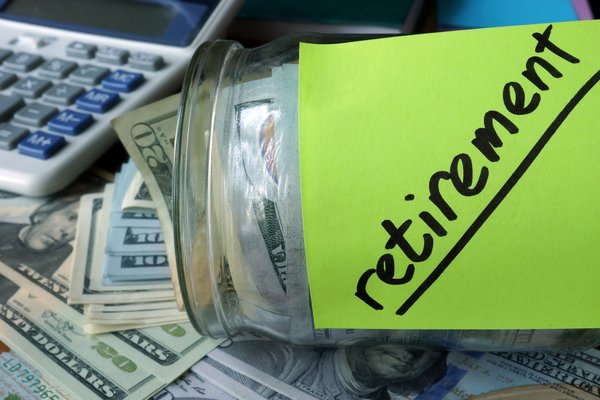The short answer is that you can retire whenever you want, but considering how much financial comfort and stability you want to have is a more useful way to approach your decision. Let's take a look at some of the biggest concerns to keep in mind as you decide when you'll be able to comfortably retire.

Will you have enough income after you retire?
This is the No. 1 question that will determine whether you're ready to retire. Despite the popular misconception that you need to aim for a specific dollar amount in savings (like $1 million), the real question is how much income you'll have. In other words, someone who has a large monthly pension but little in savings might be in better shape than someone with a few hundred thousand in the bank.
The average American should expect to need about 70%-80% of their pre-retirement income to sustain the same quality of life after retirement. The percentage can be higher or lower depending on your particular retirement vision, but it's a good starting point.
Plus, in retirement, your income can come from Social Security, other fixed sources such as pensions and annuities, and of course, your savings. So the first step is to determine where your retirement income will come from. Do you have a 401(k)? A traditional or Roth IRA? Money in a standard savings account?
When can you start collecting Social Security and how much will you get?
Social Security is designed to replace about 40% of a person's pre-retirement income. So while it won't likely be enough by itself, the retirement program is certainly a critical part of the equation.
Without getting too deep into the weeds, Social Security benefits are calculated based on your 35 highest-earning years. As of July 2020, the average American's Social Security retirement benefit is $1,469, and the maximum benefit at full retirement age is $3,011. To get a good estimate of how much you could get from Social Security, check out your latest Social Security statement or log into your mySocialSecurity portal at www.ssa.gov.
So when can you start collecting those benefit checks? The Social Security Administration (SSA) defines an official full retirement age based on your year of birth, though technically, any American who qualifies for a retirement benefit can start collecting at any point after the age of 62.
However, choosing to start collecting Social Security at any age other than your full retirement age will permanently adjust your benefits up or down to compensate. If you claim Social Security at age 62, you'll receive smaller checks for more years; alternatively, if you delay claiming until age 70, you'll receive larger checks over fewer years.
How much do you need in savings?
Here's a quick calculation. Most retirement planners agree that you'll need about 80% of your pre-retirement income to sustain the same quality of life after you retire, so take your current household income and multiply it by 0.80. Divide the result by 12 to get an estimate of your monthly income needs in retirement. Keep this amount as-is to simplify, or adjust it higher or lower according to your retirement ambitions. For example, if you plan to travel the world after you retire or pursue an expensive hobby, you may want to plan on additional income.
Next, subtract your estimated Social Security benefit, as well as any pension income you expect. What's remaining is the amount of income you'll need to generate from your savings each month, so multiply by 12 to determine how much you should plan to withdraw from your savings each year.
A standard rule of thumb says that you can reasonably expect to withdraw 4% of your savings in your first year of retirement, and increase this amount for cost-of-living adjustments in subsequent years, without having to worry about running out of money. While this rule is admittedly not perfect, it is a good estimate of retirement readiness.
To apply this rule, simply multiply the amount of retirement income you'll need from savings each year by 25. So, if you determine that you'll need $30,000 in annual retirement income from savings, you should aim for a $750,000 nest egg before you quit your job.
Related Retirement Topics
When can you retire?
The bottom line is that you'll be able to retire when the income streams you create -- Social Security, your savings, and any other sources you might have -- are enough to support your desired standard of living after you leave your job. Of course, there's no one-size-fits-all answer here. Many retirees plan to travel the world after they retire, while others are perfectly content with living a simple (read: inexpensive) life. If you aren't sure if you're on track for the retirement you want, it's a smart idea to consult a financial advisor who can assess where you stand and suggest a savings and investment plan to get you where you want to be.










